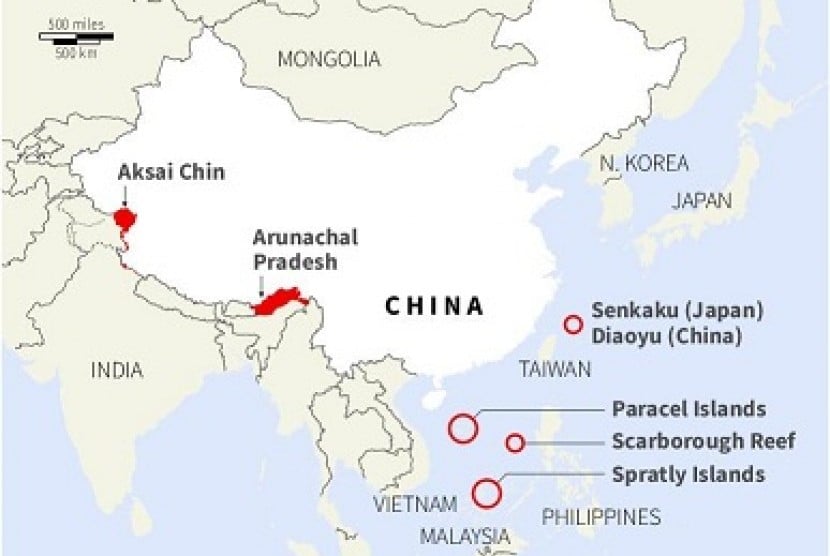REPUBLIKA.CO.ID, BEIJING/MANILA - Police in the southern Chinese island province of Hainan will board and search ships which illegally enter what China considers its territory in the disputed South China Sea, state media said on Thursday, a move likely to add to tensions. The South China Sea is Asia's biggest potential military trouble spot with several Asian countries claiming sovereignty over waters believed to be rich in oil and gas.
The shortest route between the Pacific and Indian Oceans, it has some of the world's busiest shipping lanes. More than half the globe's oil tanker traffic passes through it. New rules, which come into effect on January 1, will allow Hainan police to board and seize control of foreign ships which "illegally enter" Chinese waters and order them to change course or stop sailing, the official China Daily reported.
"Activities such as entering the island province's waters without permission, damaging coastal defence facilities and engaging in publicity that threatens national security are illegal," the English-language newspaper said.
"If foreign ships or crew members violate regulations, Hainan police have the right to take over the ships or their communication systems, under the revised regulations," it added.
Hainan, which likes to style itself as China's answer to Hawaii or Bali with its resorts and beaches, is the province responsible for administering the country's extensive claims to the myriad islets and atolls in the South China Sea.
The Philippines, which also has claims to parts of the South China Sea, said the move could violate international maritime laws allowing the right of passage and accused Beijing of trying to escalate tension in the area.
"That cannot be. That's a violation of the international passage (rights)," Marine Lieutenant-General Juancho Sabban, commander of military forces in the western Philippines, which covers the contested area.
"That's too much. While we are exerting all peaceful means, that is what they are doing."
Raul Hernandez, a spokesman for the Philippines' foreign ministry, was more circumspect, saying the government was still checking the reports. "If it is true, it will pose a concern to the Philippines and the international community," he added.
Rex Robles, a retired senior Philippine naval officer and security analyst, said China was just testing the reaction. "Those warnings are not directed at us. They might be trying to find out how far the United States would react because this could affect freedom of navigation in one of the busiest sea lanes in the world. If this is an official policy announced by Beijing, this is very serious and a cause of concern."
China has said in the past it will respect freedom of navigation in the South China Sea and that it has no intention of trying to restrict access to the area's vital shipping lanes for legitimate vessels.
Chinese Foreign Ministry spokesman Hong Lei said his government, which says it will brook no outside interference in its sovereignty claims, was perfectly within its rights in allowing police to board vessels in the South China Sea. "Management of the seas according to the law is a sovereign nation's legitimate right," he told a daily news briefing.
China's assertion of sovereignty over the stretch of water off its south coast and to the east of mainland Southeast Asia has set it directly against Vietnam and the Philippines, while Brunei, Taiwan and Malaysia also lay claim to parts.
China occasionally detains fishermen, mostly from Vietnam, whom it accuses of operating illegally in Chinese waters, though generally frees them quite quickly. The China Daily said that the government will also send new maritime surveillance ships to join the fleet responsible for patrolling the South China Sea.
The stakes have risen in the area as the US military shifts its attention and resources back to Asia, emboldening its long-time ally the Philippines and former foe Vietnam to take a tougher stance against Beijing. China has further angered the Philippines and Vietnam by issuing new passports showing a map depicting China's claims to the disputed waters.


